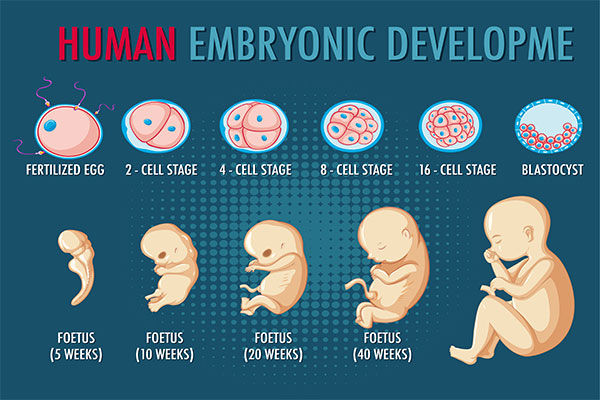
Did you know there are about 20,000 embryology clinics in India and only about 1000 embryologists to meet this on-going demand? Embryology is considered to be one of the most thriving medical specialties not just in India, but globally too. This medical speciality would be the perfect choice for aspiring healthcare professionals with the right entrepreneurial mindset. Anyone who opts to enroll in a fellowship course can expect to open up a plethora of career opportunities which will help healthcare professionals build their dream career, provide patient centric care and make a name for themselves in the field of embryology. In this blog,we will explore the scope of embryology in India, its importance in understanding the process of human evolution and the various career opportunities available in this thriving field.
Embryology is the study of embryos. An embryo is an early stage of development in which an organism grows from a single cell into a complete being. It is the study of how embryos are formed, grow and differentiate into different species. Embryology gives us insight into biological processes that underpin the formation of organs and structures, as well as how genetic abnormalities arise.
The history of embryology can be traced back to the ancient Greeks. Aristotle (384-322 BCE) was one of the first scientists who tried to explain how human beings develop from a single cell into an adult. He believed that all living things were composed of four elements: earth, air, fire and water. For example, he thought that plants grow from seeds because they contain both earth and water; animals grow from eggs because they contain both air and fire; humans are born after nine months in the womb because they have all four elements in their bodies at once!
Embryology has revolutionized the field of reproductive medicine, with various treatments introduced over the years. Here are a few fertility treatments which have changed Embryology.
In vitro fertilization (IVF) has allowed couples struggling with infertility to conceive through a process that involves fertilizing an egg outside the body and then transferring it into the uterus. Other techniques, such as intracytoplasmic sperm injection (ICSI), preimplantation genetic testing (PGT), and cryopreservation, have also emerged as popular options. These treatments have given hope to countless couples around the world and have significantly expanded the possibilities for assisted reproductive technology.
Embryology is the study of the development of embryos from fertilization to birth. In India, embryology is a rapidly growing field with a wide range of opportunities for research and employment. The scope of embryology in India is quite diverse and promising, with various applications in medicine, agriculture, and biotechnology.
In the field of medicine, embryology plays a crucial role in the development of assisted reproductive technologies (ART) such as in-vitro fertilization (IVF), which has become increasingly popular in India over the years. Embryologists are responsible for handling and culturing human embryos in ART labs, and they play a vital role in ensuring the success of these procedures.
In addition to Assisted Reproductive Technology, embryology has contributed to advancements in prenatal diagnosis and genetic screening. Embryologists work closely with obstetricians and gynecologists to diagnose and manage fetal abnormalities during pregnancy, and provide counseling to expecting parents.
Embryology also has significant applications in agricultural research, where it is used to develop new breeding techniques to improve crop yields, and in biotechnology, where it is used to produce genetically modified organisms (GMOs).
Overall, the scope of embryology in India is quite vast, and there is a growing demand for skilled embryologists in both academia and industry. With the increasing emphasis on research and development in the country, the future looks promising for those interested in pursuing a career in embryology.
Embryologists play a critical role in reproductive medicine, conducting research and using the latest technologies to improve reproductive outcomes. The scope of an embryologist's work is broad, ranging from the study of single cells to the development of entire organisms. Embryologists work in different settings, including fertility clinics, research labs, and universities. Their primary responsibilities include:
1. Fertility treatments: Embryologists can work in various fertility treatments, including vitro fertilization (IVF), intracytoplasmic sperm injection (ICSI), and intrauterine insemination (IUI). They are responsible for selecting the healthiest and most viable embryos to transfer in the patient's uterus, ensuring the best possible chance of a successful pregnancy.
2. Laboratory management: Embryologists are responsible for managing and maintaining the laboratory where embryos are cultured and stored. This includes ensuring that the laboratory meets regulatory standards and is equipped with the latest technologies for embryo culture and cryopreservation.
3. Research: Embryologists conduct research to better understand human development and improve reproductive outcomes. This includes studying the mechanisms of fertilization, embryo implantation, and the causes of infertility and genetic disorders.
4. Quality control: Embryologists are responsible for ensuring the quality of the laboratory's equipment, materials, and procedures. They must maintain strict protocols for embryo culture, handling, and storage to ensure the safety and well-being of both embryos and patients.
5. Patient communication: Embryologists work closely with fertility specialists and other healthcare professionals to develop treatment plans for patients. They are responsible for communicating complex medical information to patients in a clear and compassionate manner, ensuring that patients understand their options and feel supported throughout the fertility treatment process.
